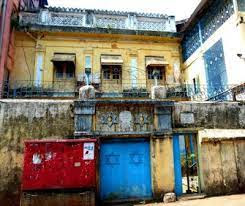#Bombayphile - Mumbai's Over 300 Years Old Connection with Israel.
My school was in the Samuel
Street of Masjid Bunder in Mumbai. As a student, I never bothered to find out
who Samuel was and why the street was named on him. I assumed that he might be
some bigshot from the colonial era. It was around twenty-five years later,
after passing out from the school, that I delved into the history of Samuel
Street while researching for my first novel “Bombay 3”. I came across a very
interesting story which tells Mumbai’s relation with the Israeli’s.
The local train travellers on the Central Railway know that the first station
after the train originates from CSMT is Masjid. The word Masjid in Urdu
translates into mosque, but in reality, the station is not named after any
mosque, but after a synagogue, a Jewish place of worship. Hardly after a two
minutes’ walk from the station, one reaches a yellow-coloured structure named “Gate
of Mercy.” There is a history of why the synagogue has been so named.
Two Bene-Israelis named
Samuel Ezekeil and Isaac Ezekeil were soldiers of the British East India
Company. In the Mysore war, they were captured by Tipu Sultan’s army and were
sentenced to death. Before executing them, Tipu asked to which caste they
belonged. When the duo told that they were Bene-Israelis, Tipu’s mother
intervened and asked Tipu to forgive them as she had read about the community
in the Holy Quran. Tipu then entered into a prisoner swap deal with the
Britishers and returned them.
Bene-Israelis came from the
middle-east several centuries ago and landed at Alibag on the Konkan coastline.
They follow Judaism. Although they follow the religious texts and practices,
Bene-Israelis have also adopted Maharashtrian customs, traditions and attires.
Many use the place of their dwelling as their surname, like Ramrajkar,
Bamnolkar, Divekar and so on.
After returning to Bombay,
they established a synagogue in 1796 to express their gratitude to God. It is
the oldest synagogue in India.Initially the location was somewhere near today’s
CSMT railway station, but in 1860, it was shifted to the present one. The
locals mistook it be a mosque and started calling it “Juni Masjid”. The area is
called Masjid Bunder due to its proximity to the port. In Marathi ‘Bunder’
means port.
The street was named as Samuel Street in his remembrance. It is hardly 200
metres away from my school’s building. Adjacent to the Samuel Street is Israel
Mohalla where several Jew families lived once. Later on, members of the Pathan
gang started living there. Few years back, an aspiring drug mafia was
apprehended from the area by the Narcotics Control Bureau. The Gate of Mercy
Synagogue is still active, although the turnout of faithful remains low. Most
of the Bene-Israelis have shifted to adjacent cities, like Thane and Navi
Mumbai.
(Bombayphile is published
every week where Jitendra Dixit writes about the past and the present of
Mumbai.)
PS: The Masjid Bunder are
mentioned in this blog is a very interesting place with a unique character
within the city of Mumbai. Those who are eager to know more must read my books
“Bombay 3” and “Bombay After Ayodhya”.


Comments